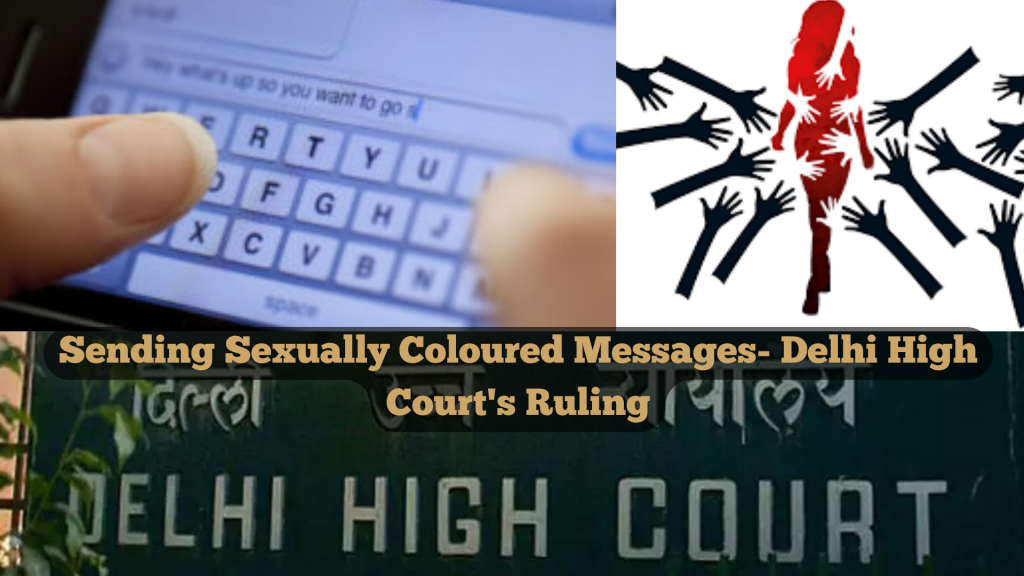
Sending Sexually Coloured Messages- Delhi High Court’s Ruling
Judgement Given On : 27/09/2017
In a significant legal judgment dated September 27, 2017, the Delhi High Court, presiding over the case of Jahid Ali vs. Union of India, upheld the dismissal of the Petitioner on the grounds of sending sexually coloured messages to his superior Lady Officer. This ruling carries profound implications within the realm of workplace ethics and the enforcement of disciplinary actions.
The Petitioner, a 29-year-old Constable (Nursing Orderly), assumed his duties within the Sashastra Seema Bal (SSB) at the 14th SSB Jayanagar on July 9, 2012. During the course of his service, he was deployed for the 6th Basic Medics Course at MTC, SSB, Shimla, spanning from June 30, 2014, to January 1, 2015. Dr. X, his senior Lady Officer at SSB Shimla, not only held a position of authority but also served as an instructor at the Training Centre, where she was entrusted with the training and guidance of junior officers, including the Petitioner.
On August 18, 2014, the Petitioner transmitted a message to Dr. X, wherein he expressed affection and admiration, stating, “I most like you. But I have little experience and don’t know how to express the feelings. You really fairy @ 12.” This message evoked an immediate reaction from Dr. X, prompting her to launch an inquiry into the sender’s identity. Subsequently, a series of messages ensued between the Petitioner and Dr. X, culminating in the Petitioner disclosing his identity to Dr. X. In due course, Dr. X formally lodged a complaint on August 21, 2014, with the Commandment.
Consequent to this complaint, an official inquiry was set in motion against the Petitioner. During his testimony, the Petitioner openly acknowledged his voluntary transmission of the messages but asserted that his intentions had not encompassed harassment. Following a thorough examination of the evidence, the Summary Force Court, operating within the framework of the SSB service rules, issued a dismissal order on December 24, 2014. Subsequently, the Petitioner’s appeal against this decision was dismissed on September 8, 2015. Dissatisfied with the dismissal, the Petitioner initiated the present Writ Petition to challenge the outcome.
Petitioner’s Legal Arguments:
Throughout the proceedings of the Writ Petition, the Petitioner presented two primary legal arguments:
- Relying on Rule 46 of SSB Rules, 2009, the Petitioner contended that the Commanding Officer bore a legal obligation to assess the Petitioner’s prior conduct before imposing the punitive measure of dismissal. The Petitioner asserted that the testimony of witnesses, specifically witness no.1 (Sri Laxman Singh, DFO (M), MTC, Shimla) and witness no.3 (Rajinder Singh, ASI (GD), MTC, Shimla), supported his contention that his general disciplinary record had been satisfactory, save for the isolated present complaint. In light of this, the Petitioner argued that Proviso (b) to Rule 46 of the SSB Rules, 2009, should have guided the Commanding Officer to dismiss the charges against him.
- The Petitioner contended that, given his immediate acknowledgment of sending the questioned SMS, a more lenient perspective should have been adopted. He argued that the penalty of dismissal from service was manifestly disproportionate to the specific misbehavior in question.
Court’s Legal Ruling:
The Delhi High Court rendered the Petitioner’s legal arguments ineffective and upheld the prior decisions culminating in his dismissal.
The Court underscored the gravity of sexual harassment within a workplace, recognizing it as a violation of fundamental rights, particularly the rights to equality, life, and liberty for women. It drew attention to the enactment of the Sexual Harassment of Women at Workplace (Prevention, Prohibition and Redressal) Act, 2013, designed to provide women with protection against workplace-related sexual harassment.
Moreover, the Court acknowledged that the SMS sent by the Petitioner unequivocally possessed sexual connotations, constituting an affront to Dr. X’s dignity, respect, and decorum. Given the specific dynamics between the Petitioner and Dr. X, characterized by a teacher-student relationship, the Court regarded the Petitioner’s actions as a breach of the boundaries inherent to such a relationship. The Court further highlighted that, within the context of the armed forces, where discipline assumes paramount significance, the Petitioner’s conduct amounted to a flagrant act of indiscipline.
As for the Petitioner’s assertion of disproportionate punishment, the Court elucidated that its role, under Article 226 of the Constitution of India, was not to function as an appellate authority reviewing the Disciplinary Authority’s penalty decision. The Court would only intervene if it found the penalty to be shockingly disproportionate in relation to the misconduct perpetrated by the accused employee.
